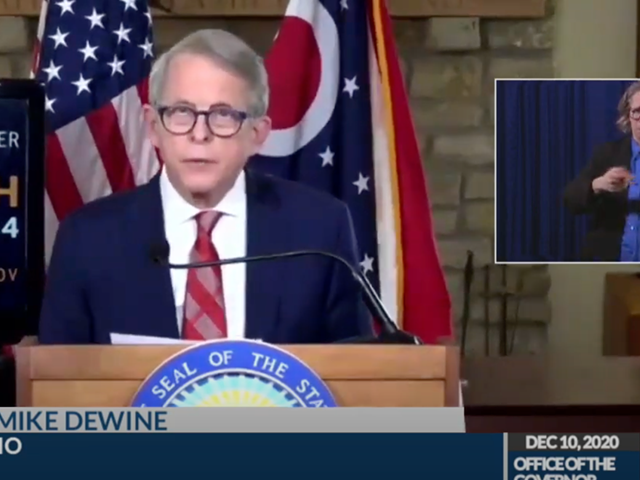For the second time during the coronavirus pandemic, Gov. Mike DeWine has vetoed legislation from fellow Republicans seeking to undercut the Ohio Department of Health’s legal authority to stymie the virus’ spread.
The nixed proposal, Senate Bill 311, would give the state legislature the ability to vote down any public health orders.
It would also forbid ODH from issuing any order “that has the affect of being a general, mandatory statewide or regional quarantine or isolation order” imposed on people who have not been directly exposed to or diagnosed with an infectious disease.
This would seem to prohibit any kind of stay-at-home order as then-ODH Director Dr. Amy Acton issued in March, although supporters of the legislation dispute this.
In a veto message, DeWine cited physicians and epidemiologists within and outside his administration who testified against the bill, saying it would take away the department’s power to quickly act with blunt orders to protect the greater public from an emerging threat.
“The notion that action cannot be taken to prevent the spread of any serious illness to those who have not been directly exposed is contradictory to public health best practices that have been scientifically tested and verified over the past 100 years,” DeWine said, citing Beth Bickford of the Association of Ohio Health Commissioners.
Lawmakers say SB 311 is about giving the legislative branch more power in how the state responds to the COVID-19 pandemic, which has killed more than 6,700 Ohioans since March, hospitalized more than 28,000 and infected about 447,000.
Many Republicans have taken umbrage with ODH issuing orders temporarily closing “non-essential businesses,” mandating the use of masks and others.
“This bill is about checks and balances,” said Rep. Reggie Stoltzfus, R-Minerva, before voting for the bill last month.
An undercurrent of unfounded skepticism of the coronavirus runs through the debate. Republicans in both chambers have aired conspiracy theories about the virus, accusing ODH of producing “fake data” or “corrupt data.”
Then-House Speaker Larry Householder, R-Glenford, prior to being indicted in an alleged corruption scheme, accused ODH of “double-counting” cases as well.
ODH has denied the allegations, an no evidence has been produced to substantiate them.
In July, DeWine vetoed Senate Bill 55, which reduces the penalty for violating an ODH order. Current law imposes a second-degree misdemeanor penalty — a maximum of 90 days in jail and $750 fine. The bill, passed on party lines, would reduce that penalty to a warning at first, followed by a maximum $150 fine and no jail time.
“(The bill) would make it difficult for local health officials to protect the public’s safety and fight the spread of COVID-19,” he wrote in a veto message. “In the midst of this pandemic, now is not the time to change tactics and impede local health officials’ ability to protect all Ohioans.”
On Wednesday, Senate President Larry Obhof, R-Medina, said the Senate is planning a swift veto override. SB 311 passed the chamber with the requisite 20 votes, even as four Republican senators — Matt Dolan, Stephanie Kunze, Kirk Schuring and Peggy Lehner — joined Democrats opposing the bill.
House Majority Leader Bill Seitz, R-Cincinnati, said he and other House Republicans are bracing for a fight on SB 311 and SB 55, as well as another related bill that would require any order from DeWine call for the “acquisition of written consent” from any person sick with an infectious disease like COVID-19 before contact tracers can begin the process of determining who he or she may have passed the virus onto.
“I would certainly hope all of us would resolutely stand by those bills … and be ready, willing and able to go to the mat to make those changes here in the waning days of the General Assembly,” Seitz said.
The House passed SB 311 along party lines with 59 votes, one short of the threshold to override a veto. However, two Republicans — Reps. John Becker and Steve Hambley — who have toed the party line on other COVID-19 measures were absent the day of the vote.
The precise effects of SB 311 are unclear. A professor of public health law said in a prior interview he’s unsure whether a stay-at-home order qualifies as a quarantine under the bill. A legislative attorney told lawmakers during deliberations she couldn’t opine how a court would answer the question.
During committee review, leaders of Ohio’s anti-vaccine groups lined up to testify in support of the proposal.
Meanwhile, the medical community overwhelmingly opposed the bill, with groups like the Ohio Hospital Association, the Ohio State Medical Association and others submitting a joint letter in opposition.
Ronda Lehman, President of Mercy Health Lima, submitted written testimony to lawmakers urging them to if not vote down the bill, at least wait until the pandemic subsides.
“I assure you, this public health crisis is not over — in fact, we are in the most critical time now,” she said. “There will be a time to assess and debate our world, national and state response to COVID-19, but I do not believe that time is now.”
This story was originally published by the Ohio Capital Journal





